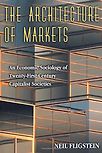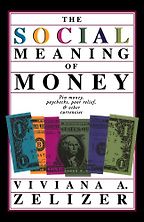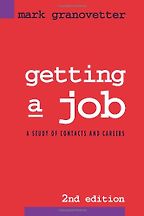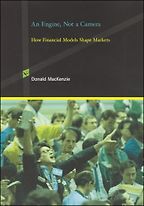Economic sociology is our topic. Please explain this hybrid discipline to those of us unfamiliar with the field.
People tend to make an artificial separation between what they do in economic life and what they do in the rest of their lives. Economic sociology breaks down the distinction between those two things. For example, if you think about what’s important in your every day it’s the people you know – your family, your friends, your colleagues. Market and economic processes rely on those things as well. So the same kind of things that matter to you every day matter in the way that markets operate.
Will you distinguish between the classic era of economic sociology, whose hallmark was the work of Max Weber and Emile Durkheim, and the contemporary work of economic sociologists such as yourself.
Durkheim provides a great deal of inspiration for the field. Some schools of economics say society is little more than a whole bunch of contracts. Durkheim pointed out that society confers the binding force behind contracts, which would otherwise be just a bunch of words. He was also interested in how the division of labour helped produce modern society. There are Durkheimian elements in a lot of what we modern economic sociologists do. Durkheim probably operated a little more at the macro level than contemporary economic sociologists, who often focus on particular markets.
Weber, of course, emphasised the importance of cultural factors in the development of capitalism. But he saw economics as somewhat separate from sociology. Modern economic sociologists, have empirically verified, by looking at real existing markets, that we rely on trust for markets to work, that there are no anonymous actors, that price setting doesn’t adjust all the time, and that there are profound information problems – all of the things that aren’t supposed to happen in markets according to the neoclassical view. Weber was willing to erect a barrier between the social and the economic. That barrier has been knocked down.
What is the distinction between economic sociology and socioeconomics?
There are a variety of fields that have different ways of examining how social and political factors impact the way markets works. People mobilise different disciplines and concepts to examine economic life.
Let’s go to the examinations of economic life in the five books you have selected. Currency seems like a good place to start our discussion of economic sociology. Please tell us about The Social Meaning of Money, by Princeton’s Viviana Zelizer.
People tend to think that a dollar is a dollar. That money is interchangeable and impersonal. At least this is the argument that economics makes. What Viviana showed is that, in fact, people divide currencies in different ways, according to the social purposes for which they’re used. For example, if a holiday is coming people will sit down and put a bunch of money aside to spend on gifts. That money becomes segregated so it isn’t spent in some other way. The book reviews how different social strata differentiate, earmark and even decorate the dollar. She shows how people really save and spend.
This book, focused on the United States between 1870 and 1930, draws on oral testimony, court records, etiquette books, household manuals, women’s magazines, novels, plays and advertisements to investigate the sociology of money. Please explain how Zelizer utilises the theory and methods of sociology to explore The Social Meaning of Money.
By going back to different kinds of archival sources, she recovered how people really thought and talked about money. One of the things she’s very interested in is how household money gets used for different purposes. By going through old periodicals she saw how people wrote about money and therefore how they thought about it. She’s interested in the fact that the way people thought about organising their lives affected the way they organised their money. She uses these sources as an insight into that.
How does this work differ from that of an economic historian?
Many economic historians engage in the technical labour of, for instance, reconstructing wheat prices over 200 years. They’re not thinking about history in anything other than economic terms. What Zelizer is trying to do, and other people in economic sociology are trying to do, is show how social life itself affects the way people engage in economic transactions. That’s the division of labour between sociology and economics. Economic historians apply theory to history whereas sociologists see that in different times and places there are different sets of cultural understandings regarding economic activities.
Let’s turn to a book that was first published in 1974. Please tell us about Getting a Job by Stanford sociologist Mark Granovetter.
You can’t talk about economic sociology without talking about Mark Granovetter. Getting a Job is a classic work of economic sociology. It’s really the only book he wrote – he’s mostly an articles academic.
Getting A Job started as Granovetter’s Harvard PhD dissertation, in the early 1970s. It is a very interesting study of how people get jobs. His findings won’t seem groundbreaking in 2012, but in 1973 they were. He interviewed both middle- and working-class people in the Boston area to find out how different kinds of people got jobs.
What he discovered is that the way people mostly get jobs is through secondary ties – not through close ties or associates but through people they know less well. And, obviously, social ties are often associated with social class. Generally, the people you know share your socioeconomic status. Therefore, the opportunities you have are determined by where you start out. The book had a huge effect on our understanding of stratification and economic sociology.
He came to call this “the strength of weak ties”. Our modern concept of networking as a way to accomplish things in modern life comes from what Granovetter was able to demonstrate in this book. He’s one of the people who brought network analysis into sociology and into the public view.
Do we owe the notion of a social network to Granovetter and this book?
At Harvard, Mark was a student of Harrison White, who pioneered formal network techniques in sociology. Mark showed how to use the ideas in an economic context. He points out that social ties affect economic outcomes.
An economist looks at getting a job as an information problem, an impersonal process. You search and you have a cost benefit analysis and you decide. Granovetter introduces the whole idea of social structure into economic processes. He underscores that the social is part of the economic; that what should be entirely economic – how you get a job – is completely shaped by social networks. Subsequent to Granovetter, other people took up this idea and used it in other contexts. He popularised the notion of social networks.
Granovetter studied “social networks” four decades before “social networking” became a daily online activity. Does sociology shed light on how the Internet and applications like Facebook and LinkedIn are transforming economic relationships?
Sociologists have this term – performativity. It means that when people become aware of a certain idea or concept they can take that idea and mobilise it. This is a basic sociological process. Humans borrow ideas and then put them into play in new and novel ways. That’s performativity – people performing new ideas.
Once you understand the logic of network analysis you can deploy it in all kinds of contexts. For example, Facebook suggests “friends” based on network analysis. If you have two friends and I have three friends, two of whom are the two that you have, Facebook thinks you might know my third friend because we’re structurally equivalent. Structural equivalence is one of the ways Amazon figures out what kind of books you might want. So a lot of the stuff on the Internet performs network theory and by doing so makes changes in the way people think and operate.
Additionally, the business models of Facebook and LinkedIn seem based on these network models. Research shows most people use these applications for people that are already in their lives. You have people out there friending 500 others but there’s always a core group of about 15 who are really communicating with each other. This is true in normal life as well. So, in some ways, the Internet mirrors the way people act offline.
Next, please tell us about Frank Dobbin’s Forging Industrial Policy.
Forging Industrial Policy is an economic sociology classic and looks at the evolution of railroad policies in England, France and the United States. Railroads are a track-bound means of transport, yet different countries with different cultural and political traditions organised railroads in different ways.
The French railroad system grew out of the French government, which saw it as a development project. The French rail system is unified and rational, the government underwrites the whole thing and actually set up a school where people are trained to be engineers. The French created what they thought was a rational and efficient system. I use that word efficient intentionally. What economists mean by efficiency is competition that theoretically forces two sides to offer the best price and service. The French thought the way you got efficiency was by giving engineers a free hand to do what made sense.
As you might expect in the United States, where the central government was weak, especially in the 19th century, there was an amazing amount of competition to build rail lines. There was vast overbuilding – at one point there were five separate lines between New York and Chicago. Nobody could make any money so railroads went from boom to bust continuously. These bankruptcies were economic shockwaves. This laissez faire model continued until the early 20th century.
The British model was somewhere in between. Each model reflected the society it sprang from, not some interchangeable economic principles.
What makes this a “classic work of economic sociology”? What does Dobbin base his analysis on?
There are two things. On the theory side, it’s his focus on the role of the government and the role of unique national cultures. On the method side, it’s Dobbin’s comparison of national cultures over a long historical period, which is what a fair amount of economic sociology does.
Distinction, by one of France’s leading sociologists, Pierre Bourdieu, was named one of the 20th century’s 10 most important works of sociology. Please tell us about it.
This is a really important book. Bourdieu argues that people’s preferences are socially constructed in several ways. He doesn’t see consumption as something we do to satisfy needs; he sees consumption as a function of social status. We consume to become the person that we want to be. So if I’m interested in being ecological then I purchase green products. The things I consume are who I am.
Bourdieu offers us a couple of ideas about how that works. One is our socialisation in childhood. He evokes the idea that people in different social classes will be socialised to want certain kinds of things. The other factors are the amount of actual capital you have and what he calls cultural capital, which is sophistication. So if we have a lot of money but no cultural capital we’ll consume conspicuously. If we have a lot of cultural capital but little actual capital we’ll live in Brooklyn.
Bourdieu mobilises a survey that was done in France, which shows these variables across a wide variety of lifestyle factors. The book shows consumption is an expression of self by analysing this data.
Apart from being an important work of sociology, how has this book impacted on the work of economic sociologists and economists?
Bourdieu’s language – social capital and cultural capital – seeped into sociology and everyday life. But economics has remained by and large impervious to most sociological ideas. Every so often economists pick one up – they picked up social capital and they’ve picked up network analysis a little bit. What they do is usually separate it from its roots and fail to cite its original source. I’d be shocked if any economist of any stature ever cited Bourdieu. When they do pick up and deploy ideas they use their own grammar and act as if they made the ideas up.
Let’s end with University of Edinburgh sociologist Donald MacKenzie’s 2006 book, An Engine, Not a Camera, which is subtitled How Financial Models Shape Markets. What does the book tell us about this topic?
This is one of my favourite books. MacKenzie is interested in this performativity question – the degree to which markets themselves are formed around economic ideas. The book is about the origins of option trading markets and derivatives more generally. His analysis, like a lot of economic sociology, is historical. It’s looking at the origin of market shifts and market institutions, it’s looking for the role of different actors.
MacKenzie focused on the use of the Black-Scholes-Merton equation for pricing options and the role it came to play in building an options market. How did the options market come to be? That’s the point of the book.
He shows that a set of innovations took place in the Chicago Board of Trade and Chicago Options Exchange at the beginning to make the trading of options, which are essentially bets on the price of a commodity, legal. Under option laws you actually had to at some point be able to take possession of what it is that you’re buying and the options market started around commodities, so if you bought 100,000 barrels of oil to be delivered in September at a certain price and you pay options to take delivery, theoretically you could take delivery. This created the illusion that options were a form of insurance instead of a form of gambling.
In the 1970s people wanted to start buying options on things that they weren’t necessarily going to take delivery of. By the definition of the Securities and Exchange Commission, doing things like this was gambling, so they had to get the government to agree that what they were doing wasn’t illegal. They got the government to agree to let them trade this stuff. But at the beginning nobody could figure out how to price it. Three financial economists, Black, Scholes and Merton, came up with this equation to price options.
At the beginning the equation performed very badly, but as people began to use the equation to estimate price, its predictive power grew. If you think about this as a social process, you can have 1,000 traders and all of a sudden a substantial number start using the same equation – the equation actually helps to organise the market. He showed how that happened with Black-Scholes-Merton.
The title, An Engine, Not a Camera, is a paraphrase of Milton Friedman. Can you please explain the reference?
It means that markets are constructions, not cameras that capture reality. Let me put this in context: There was a debate for a long time in economics about whether economic theory is real. There were two points of view. One is that economic theory ought to be realistic – in other words, it ought to be a camera that captures the way the world really looks. Friedman argued that whether the world is or isn’t consistent with theory doesn’t really matter. What matters, according to Friedman, is that the theory helps us construct the way the world should be and gives us a way to understand the world. It’s not really a problem, for economists, that their theories aren’t realistic. We can create an engine, like these financial markets, which reflect economic theories and not reality.
Your book The Architecture of Markets helps readers understand the social construction of markets generally. Please tell us about it.
It lays out how to think about the relationship between sociology and markets. It begins by posing a small set of questions that encompass a lot of what people are doing under the title of economic sociology or the sociology of markets. It tries to think harder about political, social and legal factors in the conception of markets; it tries to include both elements that are more macro, like the role of politics, and then it also tries to consider how particular markets come into existence and become stable by surveying a large variety of studies that we’ve done over the last 20 or so years.
You’ve applied the tools of economic sociology to help the world understand the roots of the financial crisis. Please brief us on your findings.
Economic sociology can help us understand the roots of the problem. For example, what the firms, the banks were doing, and the relationships between the banks. Most of the analysis that we have didn’t really consider the banks themselves as actors in what happened: They start with financial products or with the financial crisis and they see a liquidity crisis not a sociological one. In fact the liquidity crisis was a result of the way banks were organised and what they were doing to make money.
The work that I’ve done looked at the history of the mortgage security industry. What happened in the 1990s was that Wall Street and the mortgage industry converged. The main product that Wall Street sold was mortgage-backed securities and credit-default obligations, MBS and CDOs. We had a merger between the mortgage market and the securities market that set up the climate for the crisis. The commercial banks became investment banks, a lot of mortgage banks became investment banks, the investment banks bought mortgage originators.
By the time we got to 2007 the structure of all the banks looked the same. This helps explain why Washington Mutual and Bear Stearns both went bankrupt. They evolved into essentially the same sort of institution. This is what economic sociology can show. What happened in these markets over time was really a social process – banks began to mimic one another’s behaviour and to resemble each other.
Regulators by and large either ignored or didn’t understand this process. I called it regulatory capture – the regulators came to think like the bankers. And regulators didn’t really understand what was going on. My best place for seeing this is that in the spring of 2007 Ben Bernanke gave testimony to the American Congress about the mortgage crisis, which was already starting to evolve, and essentially he testified that the mortgage subprime crisis was going to be restricted to the subprime market but there was no way it was going to spread to the rest of the financial business. He didn’t really understand the whole system or that it was a system, that subprime mortgages were the main product of the system at that point. It took another year and a half for him to realise that, which just shows you the limits of economics as a way of understanding these processes. It’s sociology that connected the dots.
At the beginning of our discussion, you filled us in on the recent past and roots of economic sociology. How is it evolving to help us understand the world we live in? What is the future of the field? And will it further undermine the underpinning of “the dismal science”?
The field is very vibrant at the moment. Economic sociologists are working in a bunch of interesting directions. People have become less shy about going right into the heart of market processes and finding the social. That’s one of the reasons why I like the Lucien Karpik book, Valuing the Unique. It’s about why one penny is worth one cent and another is worth $5m, why a bottle of wine that [wine expert] Robert Parker says is a 93 [out of 100] is worth $100 and another bottle of wine he says is an 87 is only worth $20.
There’s a lot of interest in pushing even further into understanding how valuation works. There’s a lot of interest in seeing how social status affects these processes and how we define ourselves by what we own. There’s a lot of interest in markets and morality, how we limit what markets can and can’t do. There’s a lot of interest in entrepreneurship, how new markets come into existence and their resemblance to social movements. Economics has almost nothing important to say about entrepreneurship and a lot of what’s being said about entrepreneurship comes from sociology.
Business schools are increasingly interested in applied economic sociology. Entrepreneurial studies are based on economic sociology. Courses on marketing and branding are infused with economic sociology. The main way in which economic sociology finds its way into the mainstream is through business studies and network analysis. And as for the dismal science of economics, I think reality undermines it every day without this assistance of sociologists.
Five Books aims to keep its book recommendations and interviews up to date. If you are the interviewee and would like to update your choice of books (or even just what you say about them) please email us at [email protected]
Five Books interviews are expensive to produce. If you've enjoyed this interview, please support us by donating a small amount.












